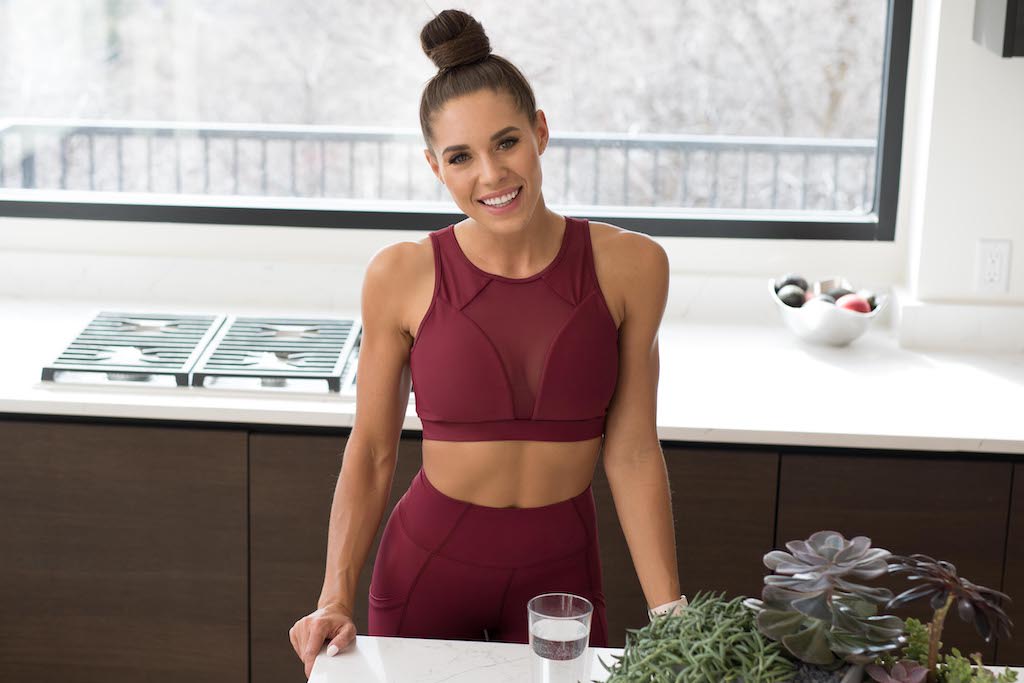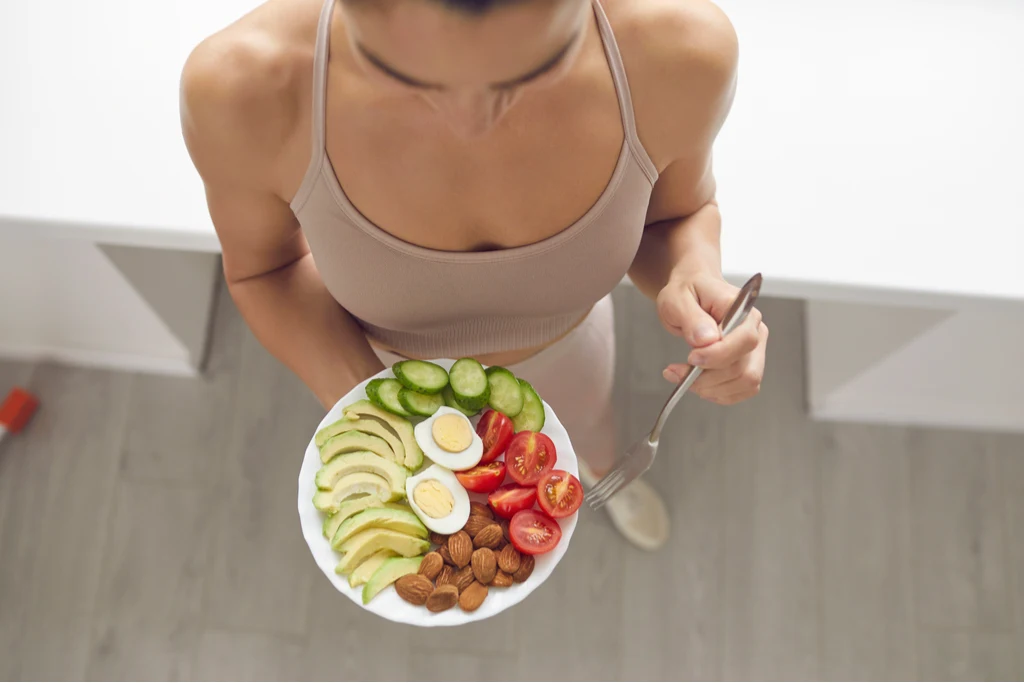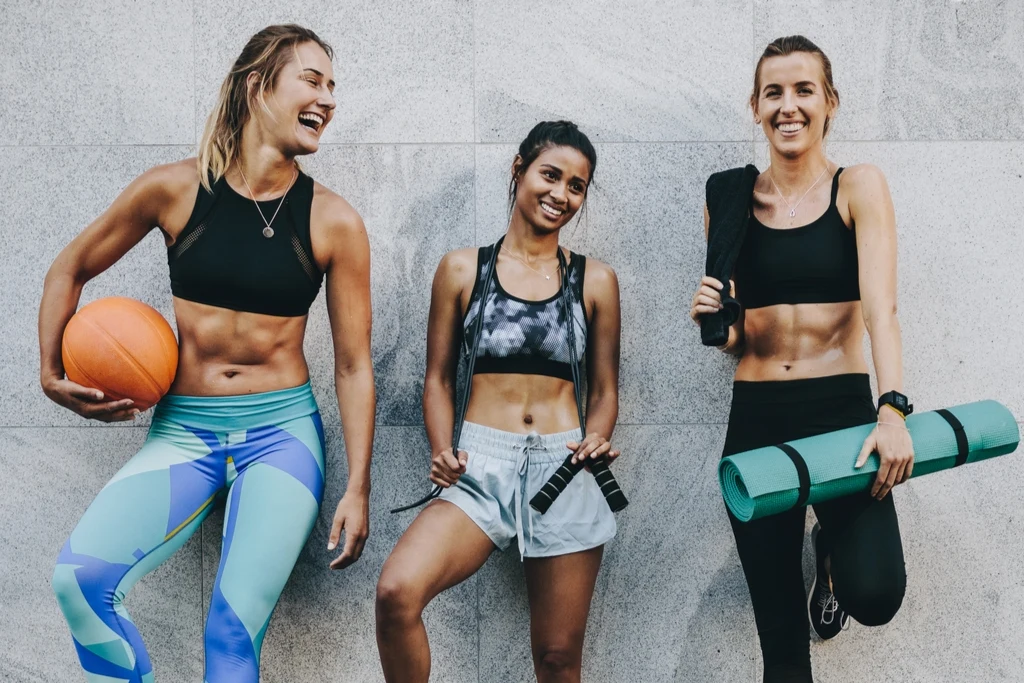High Protein Foods For Women Who Work Out

November 1, 2019

Protein is a macronutrient that your body needs to stay healthy and function the way it should — it’s vital for growth and repair, and provides the building blocks of your body’s tissue, including muscles, bones, and even your hair!
Amino acids are the compounds that form proteins, and while some amino acids are naturally produced by your body, others are only available from food sources.
Adequate protein intake is crucial for women who work out, as it helps to build and repair your muscle faster, so you become fitter and stronger.
There are a few things you should consider when choosing high protein foods, but the good news is that you can meet your protein needs by eating a variety of different ingredients, and still build muscle on a plant-based diet!
How much protein do you need?
Everyone’s protein needs are different, depending on gender, age, activity level and general health. For women over the age of 18, the recommended daily intake is 0.75g of protein per kg (or 0.3 oz per 2.2 pounds) of body weight.
However, women who are very active often need 1.2 to 2 times more. Why? Exercise damages muscle tissue which your body then repairs, rebuilding the muscle even stronger than it was before.
Protein is the essential nutrient in this process, so if you’re training regularly, it’s important to ensure you are getting enough.
In fact, research shows that an optimal amount of protein after exercise is around 20-25g. If this amount isn’t achievable immediately after your workout, don’t worry! Any protein you eat throughout the day will still contribute to your daily intake and keep your body functioning at an optimal level.
Choosing high protein foods
Some high protein foods are considered better quality than others due to the number of amino acids they contain. There are roughly 20 different amino acids found in proteins, and nine of them come from food.
When a food contains all nine essential amino acids (those your body cannot make) it is known as a “complete protein”. These foods generally come from animal sources and include lean meat, poultry, fish, eggs or dairy.
Plant-based protein foods are considered “incomplete protein” sources, so if you’re following a vegetarian or vegan diet, eating a variety of foods will ensure you get a good mix of the essential amino acids to support your health and fitness goals.
High protein foods for any eating style
Including a wide range of high protein foods you enjoy will help you reach your recommended protein intake, plus provide a range of other micronutrients and macronutrients, including carbohydrates, fats, vitamins and minerals, as well as fibre, to help your body function at its best.
Some high protein foods have a very high percentage of pure protein and others contain a percentage of carbohydrate, fat or both. This may be something to consider if you have specific health and fitness goals. and there are a range of high-protein foods you can incorporate into your diet that will also complement your chosen training style.

High protein low carb foods
Here are some examples of foods that are low in carbohydrate and high in protein:
Chicken
Grilled or baked, lean chicken breast contains a huge 31g of protein per 100g serve. Chicken can be prepared in a variety of different ways, like this Healthy Middle Eastern Spiced Chicken.
How chicken is cooked matters — highly processed foods, fried or breaded chicken may have less nutritional value than whole foods.
Red meats
Beef contains around 25g of protein per 100g. It’s also an excellent source of bioavailable iron and vitamin b12, two minerals that are important for women’s health.
Eggs
Great news for fans of eggs — they contain around 6g of protein, including all of the essential amino acids.
Most of the nutrients are found in the egg’s yolk, so make sure to include it when making dishes that require eggs, like protein pancakes!
Fish
Fish can be a healthy source of protein — tinned tuna contains an impressive 22g of protein per 85g can. Oily fish, like salmon, tuna and sardines are high in omega-3 fatty acids which support heart health. This high protein food can be a healthy choice for anyone following a pescetarian or keto diet.
High protein low-fat foods
These foods are high in protein and low in fat. They are also suitable for anyone following a vegetarian diet.
Lentils and beans
Lentils have around 9g of protein per 100g. Legumes like lentils and chickpeas are low in fat and high in fibre. You can include them in your snacks and meals like Chilli Kale Toast With Hummus.
Low-fat milk and yoghurt
Plain, low-fat Greek yoghurt contains around 10g of protein per 100g. When selecting yoghurt, look for an option with no added sugar.
One cup of low-fat milk contains around 8g of protein and includes other important nutrients. This means grabbing a latte on the way to work can help you to reach your daily protein target!
Quinoa
This gluten-free grain has a high protein content, with around 8g of protein for every cooked cup. It’s also a complete protein with all nine of the essential amino acids. Enjoy it in this Vegetarian Rainbow Quinoa Bowl or add quinoa flakes to your breakfast smoothie.
Cottage cheese
Cottage cheese is low in fat and contains calcium, phosphorus, selenium, vitamin B12, riboflavin and other nutrients. Almost 60% of the energy in cottage cheese comes from protein.
High protein vegan foods
For those following a plant-based or vegan diet, some of the foods already mentioned will be suitable. Here are some additional high protein plant foods:
Edamame pods
Edamame can make a convenient snack, giving you a boost of fibre, vitamins and minerals, plus around 8g of protein for every half-cup serving.
Nuts and seeds
Many nuts seeds contain more than 10% protein, including peanuts, almonds, pistachios and chia seeds. Peanut butter and other types of nut butter can be added to smoothies, spread on toast or crackers or enjoyed with raw vegetables like celery or carrot sticks.
Tofu
Tofu contains around 8g of protein per 100g, including all of the nine essential amino acids. It can be scrambled, used in stir-fries or added to a noodle salad.

What if you’re still not getting enough protein?
Generally speaking, you should get enough quality protein when following a balanced, nutritious diet. However, if one of your goals is to build muscle, a high protein food supplement might be an option, such as a daily protein shake.
There are a variety of dairy or plant-based protein powders available that can be incorporated into your diet. These should always be used as a supplement and should never replace whole foods. For the best advice, talk to your health professional who can provide you with information specific to your needs.
The benefits of high protein foods go beyond building muscle!
Protein plays a role in immune system function, appetite management and keeping your bones, nails and skin healthy.
Knowing approximately how much protein you need each day can also help with portion control. When you know what your protein requirements are, you can select foods that will provide the different nutrients you need to feel your best!
How do you get enough protein each day? Let us know in the comments!

A more empowered you starts with Sweat, and our editorial team is here to bring you the latest fitness tips, trainer recommendations, wellbeing news, nutritional advice, nourishing recipes and free workouts.
* Disclaimer: This blog post is not intended to replace the advice of a medical professional. The above information should not be used to diagnose, treat, or prevent any disease or medical condition. Please consult your doctor before making any changes to your diet, sleep methods, daily activity, or fitness routine. Sweat assumes no responsibility for any personal injury or damage sustained by any recommendations, opinions, or advice given in this article.
Nutrition